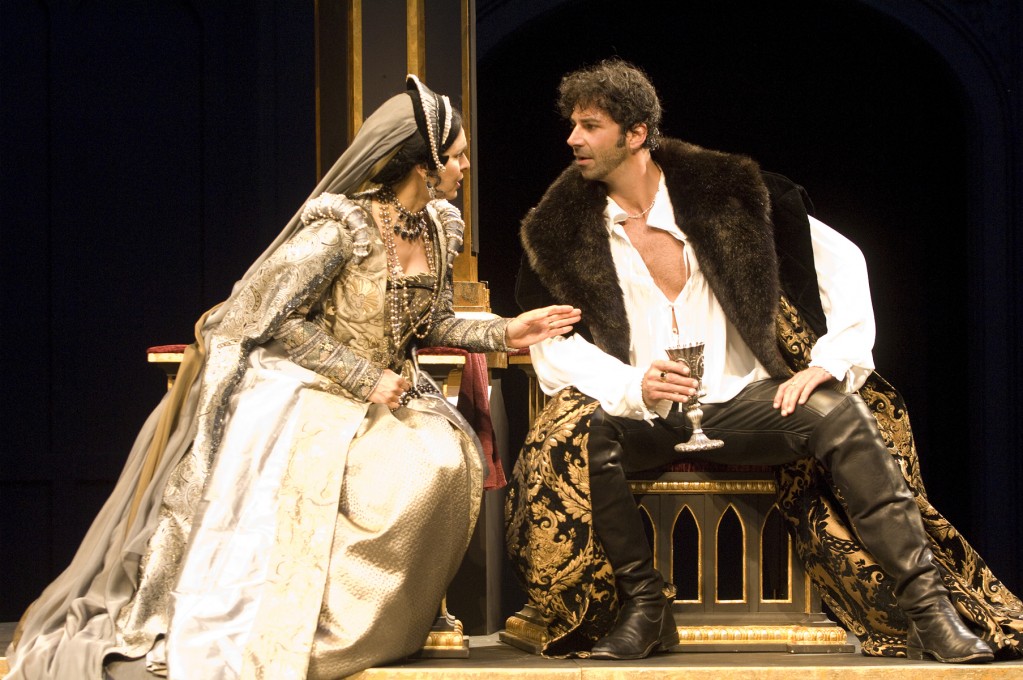
Above: Vilma Silva is soon-to-be-dumped Queen Katherine and Elijah Alexander is the charismatic king in “Henry VIII.” Photo: Jenny Graham/Oregon Shakespeare Festival/2009. Inset below: Portrait of Henry VIII by unknown artist, in the manner of Hans Holbein the Younger, ca. 1540.
I have breakfast, lunch and dinner with Henry the Eighth. Not that I let it go to my head.
A few years ago Mrs. Scatter, on one of her periodic scavenger hunts among the urban assemblages of second-hand stuff, discovered a giant street sign, weather-battered but arresting, from a British pub called the King’s Head that was part of the Vaux Brewery chain. It’s magnificent, in a run-down way. On one side, painted in the beefy commanding Holbein manner and peeling from years of exposure to wind and rain, is a portrait of Henry VIII. On the other — the side that now faces the wall — is Edward, the reluctant king who reigned over the Commonwealth for less than a year in 1936 before choosing the twice-married American socialite Wallis Simpson over the crown. Thus Vaux and the King’s Head laid claim to the two monarchs who got tangled up one way or another with divorce courts.
Now Henry eats up most of a wall in the Scatter dining room, and if guests find him threatening or domineering, they don’t mention it: no sense in ruffling the royal feathers. We call him Hank, and find him a pleasant companion on the whole. He displays a lusty appetite, which encourages good eating.
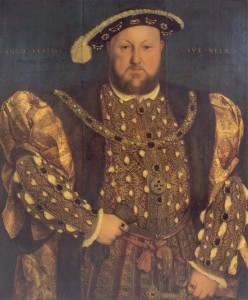 It’s almost as if we’ve turned this towering, talented, shrewd and savage leader into a pet — and so, in a way, does Shakespeare in Henry VIII, his final play. When it came to politics Shakespeare, whose company was sponsored by the king, played a necessarily careful hand (see Equivocation, below). His Henry, while hardly blame-free, is a generous-hearted fellow, good to his courtiers, solicitous of the feelings of the wife he’s dumping after 20 years, self-persuaded that his exchange of used-car Katherine for racy new convertible Anne is a matter of conscience, and painfully misled in matters of taxation and treachery by that rascal of a right-hand man, Cardinal Wolsey. In meticulously pruning the monarchial vines Shakespeare’s created a fine hearty fellow, if a little mixed-up and dense — and if there’s one thing the real Henry was not, it’s dense.
It’s almost as if we’ve turned this towering, talented, shrewd and savage leader into a pet — and so, in a way, does Shakespeare in Henry VIII, his final play. When it came to politics Shakespeare, whose company was sponsored by the king, played a necessarily careful hand (see Equivocation, below). His Henry, while hardly blame-free, is a generous-hearted fellow, good to his courtiers, solicitous of the feelings of the wife he’s dumping after 20 years, self-persuaded that his exchange of used-car Katherine for racy new convertible Anne is a matter of conscience, and painfully misled in matters of taxation and treachery by that rascal of a right-hand man, Cardinal Wolsey. In meticulously pruning the monarchial vines Shakespeare’s created a fine hearty fellow, if a little mixed-up and dense — and if there’s one thing the real Henry was not, it’s dense.
Henry VIII has some grand pageantry and good speeches and a few good character sketches, most notably of the canny schemer Wolsey and the heroically wronged Katherine, but in Shakespearean terms it’s not a very good play: too little drama, too much speechifying, too many stretches where it needs to get on with the show, and an ending — the birth in a bejeweled manger of darling little Elizabeth, hope and savior of the nation — that smacks of royal toadying to the Nth degree. So it’s a bit of a surprise that this flattering gloss of a history is this season’s best production on the Oregon Shakespeare Festival‘s outdoor Elizabethan Stage. Not the best outdoor play (Much Ado About Nothing is that, by a far shot) but the best production. Continue reading Ashland 3: the ‘Henry VIII’ whitewash, ‘Equivocation’ hits a home run
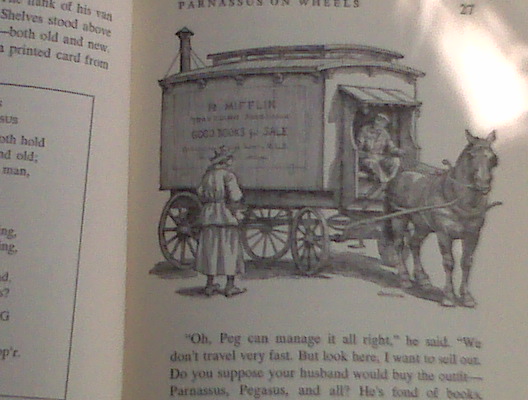
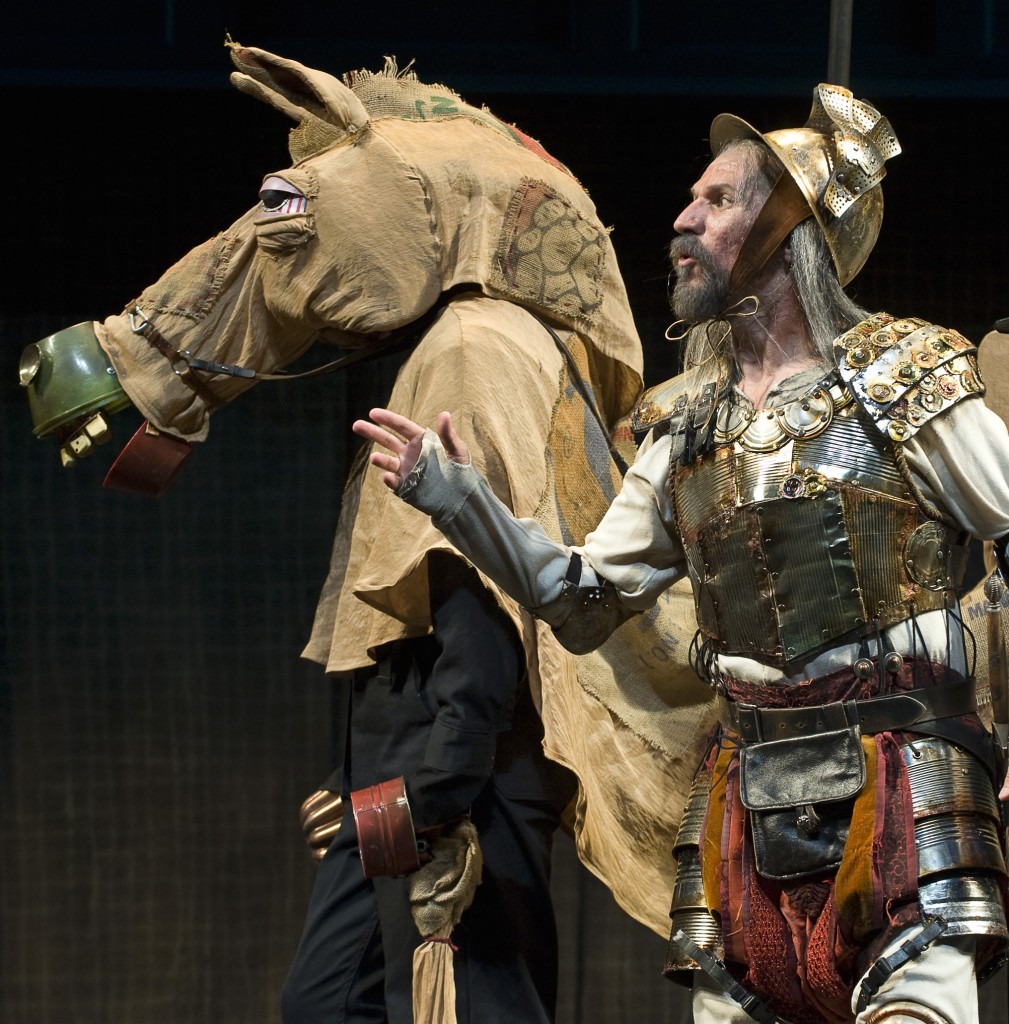
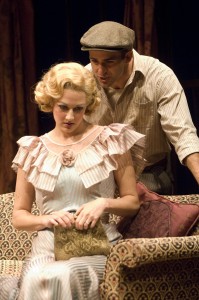 The festival’s Don Quixote is a world-premiere adaptation by the playwright
The festival’s Don Quixote is a world-premiere adaptation by the playwright 

 The intrepid Mighty Toy Cannon has the story at Culture Shock;
The intrepid Mighty Toy Cannon has the story at Culture Shock; 
 And I watch chick flicks. Not just any chick flick, but the well-written, well-performed ones that tend to fall into the folds of screwball or romantic comedy. Yes, I like the movies of Nora Ephron, and if that drums me out of the league of tough-guy arts observers, so be it.
And I watch chick flicks. Not just any chick flick, but the well-written, well-performed ones that tend to fall into the folds of screwball or romantic comedy. Yes, I like the movies of Nora Ephron, and if that drums me out of the league of tough-guy arts observers, so be it.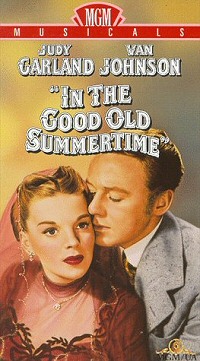 The best chick flicks exude optimism, which of course makes them immediately suspect in intellectual circles. (Then again, a lot of intellectuals miss the point that Waiting for Godot is as much a vaudeville comedy as it is an existential outcry: Even Beckett enjoyed a good giggle.)
The best chick flicks exude optimism, which of course makes them immediately suspect in intellectual circles. (Then again, a lot of intellectuals miss the point that Waiting for Godot is as much a vaudeville comedy as it is an existential outcry: Even Beckett enjoyed a good giggle.) It’s a coupling of equals built on compromise and respect, and it typically involves wriggling out of a bad potential match and shedding several layers of self-delusion so you can see the simple beauty of what ought to be. That often requires eating a few slices of humble pie and taking some practical steps. In that sense, Jane Austen is the mother of all chick flicks. And Shakespeare, with his comic creations of Kate and Petruchio in The Taming of the Shrew and Beatrice and Benedick in Much Ado About Nothing, might be their grandpa.
It’s a coupling of equals built on compromise and respect, and it typically involves wriggling out of a bad potential match and shedding several layers of self-delusion so you can see the simple beauty of what ought to be. That often requires eating a few slices of humble pie and taking some practical steps. In that sense, Jane Austen is the mother of all chick flicks. And Shakespeare, with his comic creations of Kate and Petruchio in The Taming of the Shrew and Beatrice and Benedick in Much Ado About Nothing, might be their grandpa. Joe Meek, maybe. Jedediah Smith. Liver-Eating Johnson. Jim Bridger.
Joe Meek, maybe. Jedediah Smith. Liver-Eating Johnson. Jim Bridger.
 “The goal is, after two years, to turn out actors who are ready to go out and act in the professional world,” Harper said a couple of weeks ago at a small media gathering to showcase the showcase and the conservatory itself.
“The goal is, after two years, to turn out actors who are ready to go out and act in the professional world,” Harper said a couple of weeks ago at a small media gathering to showcase the showcase and the conservatory itself.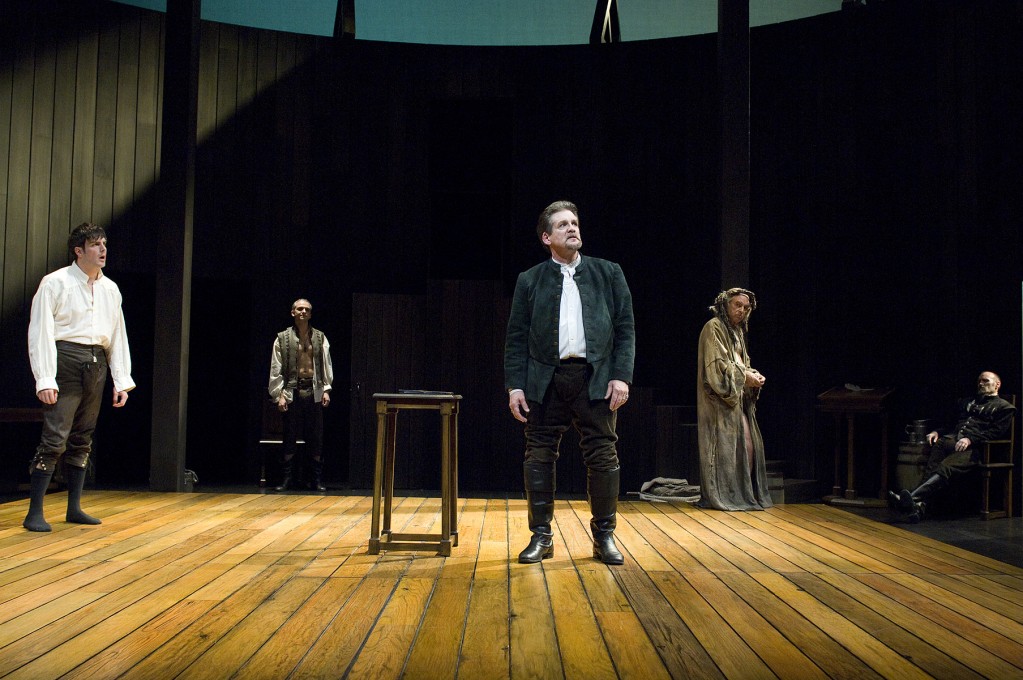
 Here’s the thing. Arts people have been around a very long time, and no matter how hard you kick ’em around, they keep popping back up.
Here’s the thing. Arts people have been around a very long time, and no matter how hard you kick ’em around, they keep popping back up. Sojourn is a Portland-based company that tours the country, developing and performing community-based plays that usually coalesce around specific themes. For the last year, among a myriad of other activities, it’s been working on a new piece called On the Table that looks at food, and how it’s grown and distributed, and the choices we make about it, and the impact it has on various communities. A lot of field reporting (in this case, literally) goes into a typical Sojourn show, and that takes time and resources. Company director Michael Rohd figures the project has another year to go: “The show will happen Summer 2010 simultaneously in PDX and a small town 50 miles from PDX, and explores the urban/rural conversation in Oregon, culminating with a bus trip for both audiences and a final act at an in-between site,” he says.
Sojourn is a Portland-based company that tours the country, developing and performing community-based plays that usually coalesce around specific themes. For the last year, among a myriad of other activities, it’s been working on a new piece called On the Table that looks at food, and how it’s grown and distributed, and the choices we make about it, and the impact it has on various communities. A lot of field reporting (in this case, literally) goes into a typical Sojourn show, and that takes time and resources. Company director Michael Rohd figures the project has another year to go: “The show will happen Summer 2010 simultaneously in PDX and a small town 50 miles from PDX, and explores the urban/rural conversation in Oregon, culminating with a bus trip for both audiences and a final act at an in-between site,” he says.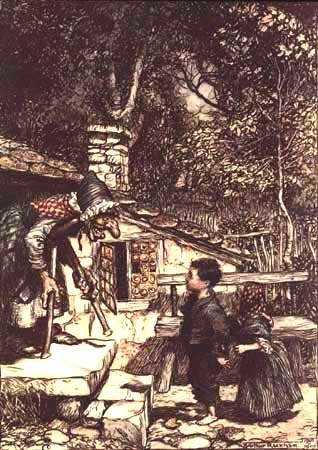 The smashing success of last Friday’s
The smashing success of last Friday’s